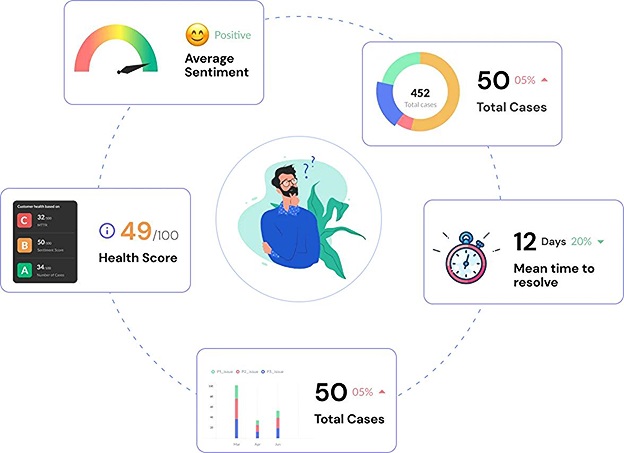
Understanding customer health is critical to the long-term success of any company.
It helps predict the future state of your relationship with the customer, reveals areas where your product could be improved, and shines a light on support and success processes that may be contributing to poor customer health.
With proactive monitoring of customer health scores, CX teams can identify and resolve issues that lead to dissatisfied customers before they hit the crisis point and before they have a chance to consider discontinuing their relationship with your company.
Fortunately, SaaS companies have discovered the value of monitoring customer health. In fact, SaaS companies are 30% more likely to use customer health scores than their on-premise or other industry counterparts. Almost half–46%– use customer health scores to forecast churn and anticipate renewals.(Source: https://www.csmpractice.com/customer-health-score).
But the news is not all good. When it comes to keeping their health monitoring approach current, 48% of companies disclosed that they update their health score algorithm only once per year, and 33% report they do so manually. With such infrequent finetuning and the impracticality of doing so manually, CX teams put themselves at a disadvantage. (source: ibid)
With so many support, engineering, and business insights locked away in siloes throughout most SaaS companies, it’s no wonder teams defer creating a meaningful customer health monitoring strategy. In most companies, no one has access to all of those systems. Support doesn’t know the bugs associated with reported issues, engineering teams are blind to the business impact customer-reported issues represent, and business teams don’t know the impact customer support tickets have on customer retention.

IrisAgent unlocks siloed information across ticket management, bug tracking, and business systems to provide a 360° view of every customer in real-time. Our proactive AI-powered approach means CX and business teams have always up-to-date insights with which to prioritize customers without ever having to update algorithms or adjust manual spreadsheets. We provide an aggregated health score derived from various sources and points in the customer’s journey to provide the most holistic picture of any customer. Here’s what IrisAgent’s custom health score includes:
Support Metrics
- Number of escalated support cases
A large number of escalated can frustrate customers since they take longer to address than more common issues. Customers who wait longer for their issues to be resolved will be less satisfied than a customer with more common issues that get resolved faster.
- Number of support cases
Everyone needs a little help now and then, but the frequency with which they interact with support agents reveals a lot about the customer’s health. Customers who contact support frequently are more likely to be less satisfied.
- Time-to-resolve
Customer support teams set expectations for the time it should take to resolve a customer’s issue. When a customer’s average time-to-resolve fails to meet those standards, it is reasonable to assume that the customer’s satisfaction will dip.
- Case priority
Like time-to-resolve, most customer support teams have an internal process for establishing case priority. While not an empirical measure, understanding the “pecking order” of cases leads back to the health of the customer. All other things being equal, understanding the relative position of a customer’s issues among all active cases can be helpful. A customer with several high-priority cases can be a sign of a distressed customer, and struggling customers tend to be unhappy customers.
- Case sentiment score
The words and phrases a customer uses when submitting a request for support provide a window into the customer’s health. IrisAgent uses natural language processing (NLP) algorithms to assign a sentiment score for each ticket.
- CSAT
CSAT surveys reflect the in-the-moment sentiment of your customers. A single unproductive interaction with customer support may not result in an overall dip in a customer’s health score but consistent negative feedback clearly indicates there’s work to be done to prevent the customer from becoming at risk of churn.
Product Metrics
- Product engagement
Understanding the frequency and depth of a customer’s use of your product reveals how dependent your customer is on your product. This metric is sometimes described as the “toothbrush test”: Is it something your customer uses every day? Knowing which customers are active users vs. casual users helps identify customers likely to churn. In addition, insight into which features your customers use most often can help get to the root cause of a support request because you understand the context in which the issue is likely to have occurred.
Business Metrics
- Annual Contract Value (ACV)
ACV gives you a clear picture of the value of each customer by normalizing the total income over contract length. Understanding the effect your support strategy and performance have on your highest value customers should drive the approach you take to support them and reinforce the importance of keeping that segment of your customers happy.
- Renewal timeframe
68% of customers churn because they believe the company providing the service/product doesn’t care about them, and many of those losses occur at the renewal point. Companies close to their renewal dates should be monitored carefully to avoid unexpected non-renewals.
- Upsell/cross-sell potential
Excellent customer support can drive upselling and cross-selling revenue. To achieve this, organizations must build a support team that turns customers into advocates, thus increasing the confidence in your company and ultimately driving more revenue for the company.
Staying on top of every customer’s health is critical to the success of your company but–as the old saying goes–you can’t manage what you don’t measure. By continually measuring support, business, and product metrics, IrisAgent helps support agents tailor conversations to the customer’s product adoption journey with empathy and patience, engineering teams can understand how bugs, releases, and regressions impact customer health, and success teams can head off issues that might impact retention and upgrades/cross-sells, all from a single dashboard. To learn more, visit https://irisagent.com/customer-health.
About the author
Palak Dalal Bhatia is founder and CEO of IrisAgent. Previously, she led product management for stateful container applications at Google. She also invested in early stage technology startups while working in the venture capital industry. She began her career as an engineer at Microsoft in their search engine team. She completed her MBA from Harvard Business School and bachelors from IIT Bombay.




